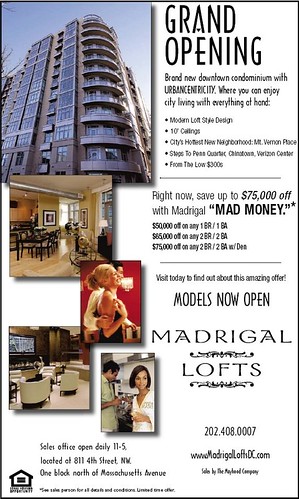Condominium Living Conundrum

Dan writes, and I don't have the answers... (I will also be forwarding this query to some e-lists.) Your comments and thoughts are requested!
--------
I'm writing because my wife and I bought a condo in DC about a year ago, and I find the kinds of things you write about on your blog -- place, public/private divides, common usage, etc. -- are also a huge part the debates that happen within my condo owner's association, and I'm hoping that you may be able to point me to resources that deal with the problems that I'm encountering.
On the one side, there are the group who I would identify with the worst aspects of a suburban mentality, which mainly boils down to the notion that public space with for appearances only. It is not, under any circumstances, to be used in a way that might lead to wear and tear, and should generally speaking be aesthetically pleasing but inhospitable (an obvious example would be grass without benches).
On the other side, you have what I would call the urbanites -- the folks who believe that multi-use communal space should be used to supplement purely private spaces. The upside is obvious; residents are able to do things that would previously be off-limits. In my condo, for instance, we have a courtyard with a lawn. The lawn is the one part of the complex that's more than 10 feet from the building, meaning that it's the only place one could legally grill. Part of the trade-off is that there will be people who do things that you don't like, and who will place some wear and tear on the common spaces that a single person alone would not.
I fall pretty squarely in the latter group. In discussions with people in the former group, though, I have a lot of trouble explaining why I don't, for instance, think that it's a big deal that some people have cardboard boxes in their parking spaces. And, in a similar vein, I have trouble explaining why I think that it's actually advantageous to have useful common spaces. In fact, the word "useful" seems to be one that appeals only to people like me.
Do you know of any resources on this kind of problems? It seems like the kind of problem you'd run into at any ANC or SMD meeting here in the district, and I imagine that it's well covered in the literature. If you have a few moments and could let me know if you know a place where I could start, I would be very appreciative.
--------------
My initial response:
Condos are weird I guess, in pondering over your query, because you have to balance the public and your association with others, with the very intense rights of private property. Having been on an ANC zoning committee, my experiences with condos weren't great because we encouraged them to provide shared parking spaces, but the lawyers always said no because they didn't want to provide access to noncondo dwellers.
The trick is to find a condo lawyer who is enlightened on public space issues, to run this by. But the basic public space arguments, private property issues ought to maintain...
1. Personally I feel that homeowner assns. are too restrictive. There is a balance between protecting property interests and value from negative behavior by certain owners and having a completely controlled homogeneous environment. E.g., I can't see the private interest in dictating how a parking space is used to the extent where people can't use it for storage, although I can see the public interest in requiring that the parking space, if being used for storage, be adequately maintained. Restricting it to cars could be considered against the public interest (if you could find a good anti-car lawyer) and therefore not supportable, although condo rules tend to trump broader public interest guidelines legally.
2. And you have to provide ways for people to come together within your building, so that your building is more than 4 walls but the opportunity and place for community.
--------------------
Maybe 24 years ago I read the book Condominium by John McDonald. It's always worth a read if you can find it. In that book, developers worked with Mafia-controlled trash companies and controlled the creation of the associations. In the particular case, the condo fees weren't high enough to support the building, and some of the residents, on fixed incomes, couldn't afford increases. Speculators were caught, etc. Then in the end the building gets destroyed, along with the key on which it and many other buildings were located, by a hurricane.

Labels: civic engagement, housing, urban design/placemaking



1 Comments:
Buying a condominium unit is a very important decision to make and being able to read this article helped me a lot in making a decision.
Toronto Condominiums
Post a Comment
<< Home